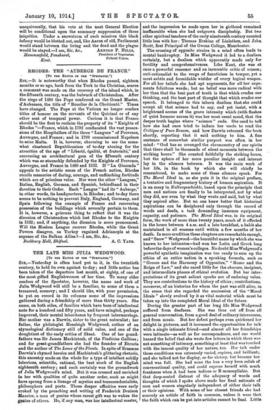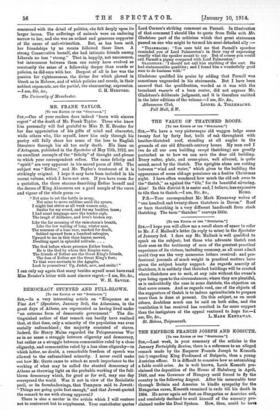THE LATE MISS JULIA. WEDGWOOD.
[To an Rerrea or an “Eirecraroan
Sra,—Yesterday is often hard put to it, in the twentieth century, to hold its own against to-day ; and little notice has been taken of the departure last month, at eighty, of one of the moat gifted Englishwomen of her time. To many older readers of the Spectator, however, the name and work of Julia Wedgwood will still be a familiar, to some of them a treasured, memory; and I should like, with your permission, to put on record in its columns some of the impressions gathered during a friendship of more than thirty years. She came, on both sides, of families which have been of intellectual note for a hundred and fifty years, and have mingled, perhaps improved, their mental inheritance by frequent intermarriage. Her mother was a Darwin, sister to the great naturalist; her father, the philologist Heneleigh Wedgwood, author of an etymological dictionary still of solid value, and one of the doughtiest of the early critics of Skeet. One of her grand- fathers was Sir James Mackintosh, of the Vindiciae Gallicae ; and for great-grandfathers she had the founder of Etruria and the author of The Loves of the Plants. In spite of Erasmus Darwin's rhymed heroics and Mackintosh's glittering rhetoric, this ancestry made on the whole for a type of intellect solidly laborious, scientific, rational, the best stock of the English eighteenth century ; and such certainly was the groundwork of Julia Wedgwood's mind. But it was crossed and enriched in her with qualities of quite another order, such as might have sprung from a lineage of mystics and transcendentalists, philosophers and poets. These deeper affinities were early evoked by the preaching and writing of Frederick Denison Maurice, a man of genius whose rarest gift was to waken the gouitat of others. lie, if any man, was her intellectual master,
and the impression he made upon her in girlhood remained ineffaceable when she bad outgrown discipleship. But two other spiritual teachers of the early nineteenth century counted little lees with her Thomas Erskine of Linlathen, and John Scott, first Principal of the Owens College, Manchester.
The crossing of opposite strains in a mind often leads to mental bankruptcy. In Miss Wedgwood it led to a dualism certainly, but a dualism which apparently made only for fertility and comprehensiveness. Like Kant, she was at once a powerful reasoner and an inexorable critic of reason; anti-rationalist to the verge of fanaticism in temper, yet a most subtle and formidable wielder of every logical weapon. For all her beliefs she had apt arguments, for all her arqu- rants felicitous words; but no belief was more radical with her than that the beat part of truth is that which evades our thinking, and the beat part of thought that which evades our speech. It belonged to this inborn dualism that she could accept all that science had to say, and yet insist, with a heightened access of the grave intensity which (with flashes of quiet humour across it) was her most usual mood, that the deeper truth begins where "science " ends. She used to tell how she had once tried to induce her uncle to read the Critique of Pure Reason, and how Darwin returned the book shortly, reporting that it said nothing to him. A fine sentence of somewhat similar purport was often in her mind : "God has so arranged the chronometry of our spirits that there shall be thousands of silent momenta between the striking hours." She counted faithfully the striking hours, but the sphere of her more peculiar insight and interest lay in the silences between. It was the main work of her life, in the book by which she will chiefly be remembered, to make some of these silences speak. For The Moral Ideal is, as she puts it in the original preface. a tentative and fragmentary history of human aspiration. It is an essay in Kulturgeschichte, based upon the principle that men and nations are finally to be interpreted, not by what they did, nor even by what they wrote and said, but by what they aspired after. But no one knew better that historical aspirations can be deciphered only through the record of words and deeds, a task demanding immense equipment, capacity, and patience. The Moral Ideal was, in its original form, the work of more than twenty years, much of it effected in the hours between 4 a.m. and a late breakfast, a habit she maintained in all seasons until within a few months of her death. In mere erudition these chapters are remarkable enough, and "Snow " Wedgwood—the beautiful name by which she was known to her intimates—had won her Latin and Greek long before the days of women's colleges. No doubt Miss Wedgwood'a powerful synthetic imagination was too ready to sum up the ethics of an entire nation in a speaking formula, such as "Greece and the Harmony of Opposites," "Rome and the Reign of Law," and she cared little for the obscure, incipient. and intermediate phases of ethical evolution. But her inter- pretations of its great salient epochs are of enduring value. They are contributions to the history of ethics ; contributions. moreover, of an historian for whom the past was still alive, in the sense that she regarded the succession of the "Moral Ideals " slowly evolved by it as vital material which must be taken up into the completed Moral Ideal of the future.
During the greater part of her long life Miss Wedgwood suffered from deafness. She was thus cut off from all general conversation, from a good deal of ordinary intercourse, and from music. But her defect perhaps even quickened her delight in pictures, and it increased the opportunities for talk with a single intimate friend—and almost all her friendships were intimate—as well as for correspondence, and one would hazard the belief that she wrote few letters in which there was not something of intimacy, something at least that was touched with the inmost quality of her nature, too. Her talk under these conditions was extremely varied, copious, and brilliant; and she talked not for display, or for victory, but became her mind was full. She had none the less a very keen relish of conversational quality, and could express herself with much frankness when A had been tedious or B monosyllabic. But that deep-seated distrust of the adequacy of words and thoughts of which I spoke above made her final estimate of men and women singularly independent of either their talk or their opinions. With some of her closest friends she had scarcely an article of faith in common, unless it were that the faith which can be put into articles cannot be finaL Little concerned with the detail of politics, she felt deeply upon its larger issues. The sufferings of animals were an enduring sonrow to her, and she was an ardent and generous supporter of the cause of anti-vivisection. But, as has been said, her friendships by no means followed these lines. A strong Conservative herself, she had intimate friends among Liberals no less "strong." That is, happily, not uncommon, but interoonrse between them can rarely have evolved so constantly the seise of a fellowship deeper than creeds or policies, as did ours with her. Deepest of all in her was the passion for righteousness, the divine fire which glowed in Greek as in Hebrew, and of which policies and creeds, in their noblest exponents, are the partial, the stammering, expression.
—I am, Sir, &c., 0. H. HER8ORD. The University of Manchester.







































 Previous page
Previous page